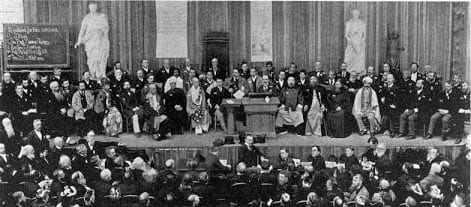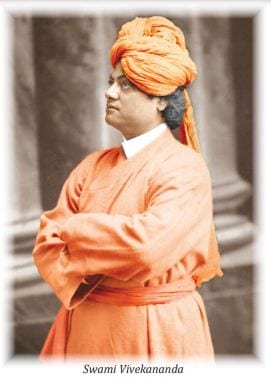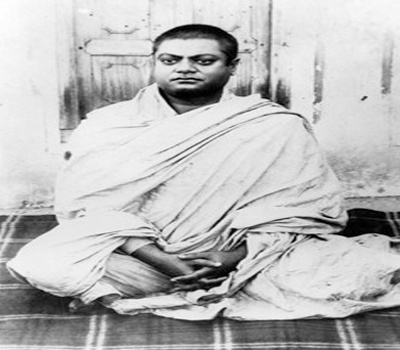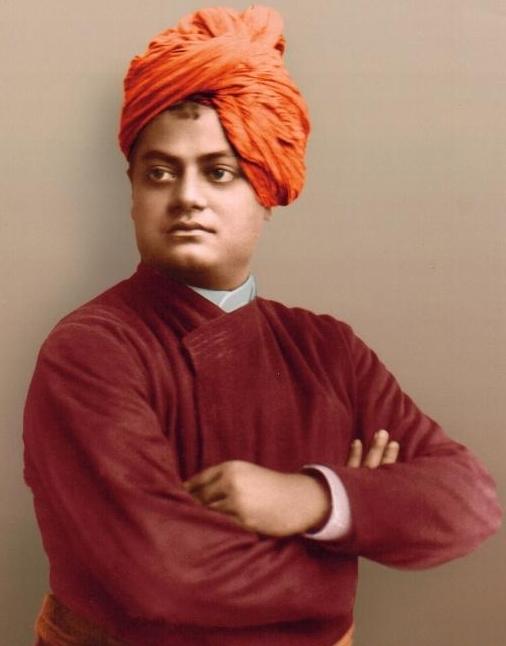What is Religious Pluralism?
The word ‘religious pluralism’ has in many cases replaced the original phrase of ‘religious toleration’. Along this line in January 1900, Vivekananda stated at the Universalist Church in Pasadena, California,
Our watchword, then, will be acceptance, and not exclusion. Not only toleration, for so-called toleration is often blasphemy, and I do not believe in it. I believe in acceptance. Why should I tolerate? Toleration means that I think that you are wrong and I am just allowing you to live. Is it not a blasphemy to think that you and I are allowing others to live?1
What follows are seven topics discussed on the subject of religious pluralism.
God’s Plan of Divine Plenitude
- At the highest level of existence there is only one eternal universal transcendental religion with many partial manifestations: Swami Vivekananda (1863-1902) averred,
The religions of the world are not contradictory or antagonistic. They are but various phases of one eternal religion. That one eternal religion is applied to different planes of existence, is applied to the opinions of various minds and various races. There never was my religion or yours, my national religion or your national religion; there never existed many religions, there is only the one. One Infinite religion existed through all eternity and will ever exist, and this religion is expressing itself in various countries in various ways. Therefore we must respect all religions and we must try to accept them all as far as we can.2 . . .So it is with this universal religion, which runs through all the various religions of the world in the form of God; it must and does exist through eternity . . . Each religion, as it were, takes up one part of the great universal truth, and spends its whole force in embodying and typifying that part of the great truth. It is, therefore, addition, not exclusion.3
It was affirmed by Swami Abhedananda (1866-1939), a direct disciple of Sri Ramakrishna, that the eternal spiritual laws and principles are the foundation of all of the higher religions of the world. They are nonsectarian and do not originate with the Divine Incarnation or a prophet who reveals them. The eternal religion (Sanatana Dharma) underlies and embraces the fundamental principles of all special religions. The universal religion,
is based upon the eternal principles and such spiritual laws as govern our life at all times, only such a religion can claim to be universal. It embraces the fundamental principles of all religions . . . It teaches unity in variety, that the Godhead is one, although the eternal Supreme Being is worshipped under different names and in various forms.4
All of the great religions of the world are only partial expressions of the universal religion. There is one God with a variety of manifestations, names and forms who manifests Himself in all religions. God has unlimited love for humanity and can incarnate wherever He is needed.
The founders of the different religions of the world represent the different ideals to be realized by different individuals. Each of them expresses only a part of the one eternal religion which is nameless and formless and which is not limited by doctrines and dogmas.5
In the ontological creative process of the universe the One becomes many, the homogeneous becomes heterogeneous. Consequently the One religion subdivides into many religions.
- God’s plan of variety in the universe is necessary for divine plenitude, the fullness of God’s expressions: Vivekananda discerned,
My idea, therefore, is that all these religions are different forces in the economy of God, working for the good of mankind; and that not one can become dead, not one can be killed. Just as you cannot kill any force in nature, so you cannot kill any one of these spiritual forces. You have seen that each religion is living. From time to time it may retrograde or go forward. At one time, it may be shorn of a good many of its trappings; at another time it may be covered with all sorts of trappings; but all the same, the soul is ever there, it can never be lost. The ideal which every religion represents is never lost, and so every religion is intelligently on the march. And that universal religion about which philosophers and others have dreamed in every country already exists. It is here. As the universal brotherhood of man is already existing, so also is universal religion. Which of you, that have traveled far and wide, have not found brothers and sisters in every nation? I have found them all over the world.6
Friedrich Schleiermacher (1768-1834), the German founder of modern Protestant theology, reasoned that,
The whole circumference of religion is infinite, and is not to be comprehended under one form, but only under the sum total of all forms . . . He must be conscious that his religion is only part of the whole; that about the same circumferences there may be views and sentiments quite different from his, yet just as pious; and that there may be perceptions and feelings belonging to other modifications of religion, for which the sense may entirely fail him.7
Abandon the vain and foolish wish that there should be only one religion . . . You are wrong therefore, with your universal religion that is to be natural to all; for no one will have his own true and right religion if it is the same for all. . . . He [Jesus] never maintained He was the only mediator, the only one in whom His idea actualized itself. . . . As nothing is more irreligious than to demand general uniformity in mankind, so nothing is more unchristian than to seek uniformity in religion . . . Varied types of religion are possible, both in proximity and in combination, and it is necessary that every type be actualized at one time or another. . . . The totality of religion requires that all of the various views and relations to God be developed. It is best for every valid form of religion to be actualized.8
Religious differences preserve the variety and individuality of each culture.
The philosophy behind religious pluralism is beautifully expressed by the Russian Sociologist Pitirim Sorokin (1889-1968),
In its plenitude this Supreme Reality can hardly be adequately comprehended by any, finite human mind and by any finite human beliefs. For this reason none of the human religions can claim a monopoly of an adequate comprehension of God, as God’s exclusive confident and agent. On the other hand, the numberless different ripples; of this Infinite Ocean allow the different groups, of believers to pick up somewhat different sets of its ripples that for various reasons most appeal to them. So understood, the differences in the chosen ripples, usually reflected in the dogmas and rituals of different religions, in no way necessitates for different denominations to be antagonistic to each other or to view one’s own beliefs as the only truth while those of other religions as totally false. Cherishing its own beliefs, the believers of each religion can equally respect the beliefs of other religions as supplementary to their own, revealing additional aspects of the mysteries tremendous et fascines ‘into which fade all things and differentiations’ (to use St. Thomas Aquinas’ expression). Viewed so, the religious differences cannot only be tolerated but genuinely welcomed and esteemed. In their totality they convey to us a fuller knowledge of the Supreme Reality than that given by a single religion.9
It is possible that as a broad generalization, Hinduism and Buddhism have traditionally placed more emphasis on transcending the world, Judaism and Christianity on changing or mastering the world, and Confucianism on harmonizing with or adapting to the world.
Liberation-salvation history (Heilsgeschichte) is not static, but is subject to change. In the course of liberation-salvation history, God reveals Himself/Herself through various religions depending on the Divine plan. The Lord works through the religion that is best suited for His/Her particular purpose at that particular time in history.
(To be continued. . .)
References
- The Complete Works of Swami Vivekananda (Hereafter CW) (Calcutta: Advaita Ashrama, 1962), II, p. 374.
- CW, IV, p. 180
- CW, II, pp. 381, 365.
- Abhedananda in India (Calcutta: Ramakrishna Vedanta Math, 1968), p. 116.
- , pp. 21, 115-16, 183-84; Swami Abhedananda, Philosophy and Religion (Calcutta: Ramakrishna Vedanta Math, 1951, pp. 27-28, 37.
- CW, II, pp. 366-67.
- Friedrich Schleiermacher, On Religion, tr. J. Oman (New York: Frederick Ungar, 1955), p. 54.
- James Livingston, Modern Christian Thought (New York: Macmillan, 1971), pp. 82, 104-05.
- Pitirim Sorokin, ‘The Western Religion and Morality of Today,’ in Toward Global Sociology, ed. G. Hallen and R. Prasad (Agra: Satish Book Enterprise, 1970), p. 179.
Source : Vedanta Kesari, October, 2015







Leave A Comment